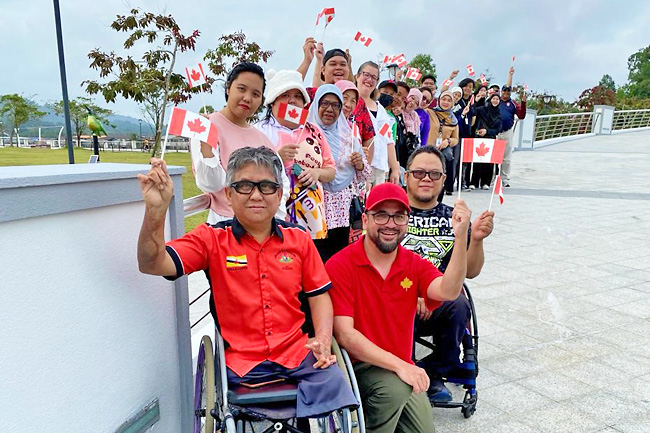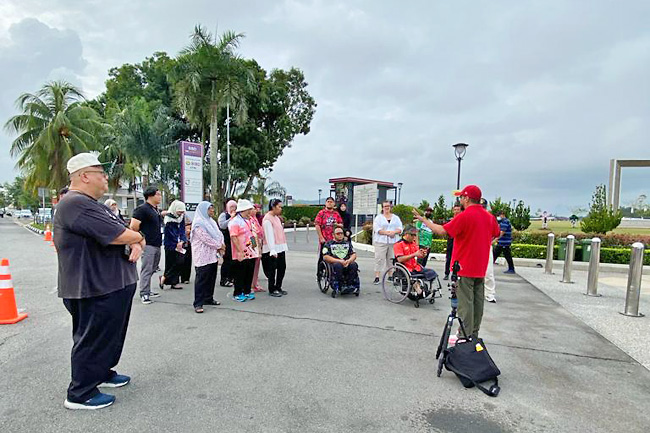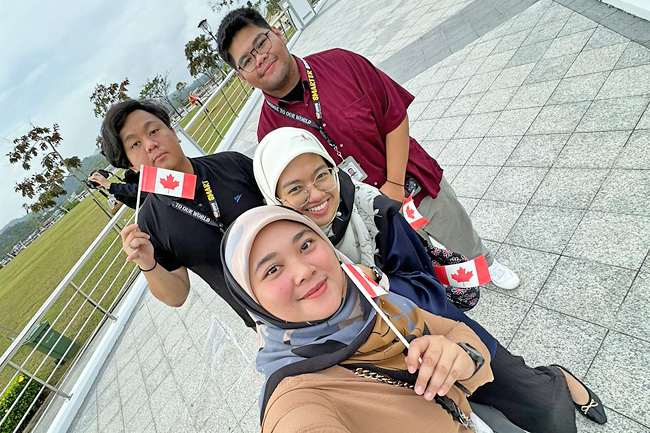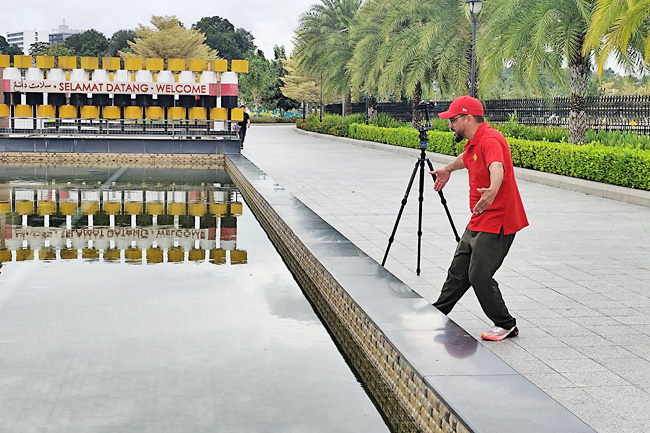On an overcast day at Taman Mahkota Jubli Emas in the capital, the air held a crisp edge as a renowned Canadian landscape photographer guided a group of Bruneian enthusiasts through a beginner’s photography session.
As the entourage strolled through the park, one participant sat to attention eagerly listening to the photography tips and techniques that are being shared.
Haji Noor Ihsanuddin bin Haji Noor Kasih is wheelchair bound, after losing both of his legs in a car accident more than two decades ago.
A STEP TOWARDS INCLUSION
The session organised by the Canadian High Commission in Brunei Darussalam led by photographer Chris Collacott, aimed at providing guidance to individuals with disabilities, along with educators and other supporters of these communities.
“We were taught handy techniques for taking photos, to make the shots look more organised and put-together.
“For people like us with special needs, it was a real opportunity to showcase our passion for photography,” shared Haji Noor Ihsanuddin.
As a former member of the Paralympic Council of Brunei Darussalam, Haji Noor Ihsanuddin believed that opening the photography workshop to individuals with disabilities was a significant stride towards fostering inclusivity within the Sultanate’s community.




This sentiment is fully championed by Collacott, who believes in sharing his photography experiences with others, especially those who may not typically have such opportunities.
Collacott himself has a son who falls within Level 1 of the autism spectrum, and as the son of a diplomat who spent his formative years in Sri Lanka, the renowned photographer is intimately familiar with the challenges faced by individuals with disabilities.
“They (children with disabilities) would often come over to our house, and I would play with them. “We would even invite magicians to perform for them – so I have been surrounded by children and adults with disabilities for as long as I can remember, especially during my childhood.”
For Collacott, it’s crucial that everyone, regardless of disability, has equal access to skills and hobbies. He firmly believes that having a disability should never stand in the way of learning something new or chasing one’s dreams.
“I think it’s essential for people with disabilities to have the same opportunities as everyone else.
“In Canada, we’re fortunate to have the resources to ensure accessibility everywhere. It’s a legal requirement for all facilities to provide disabled access, and it’s ingrained in our laws.”
Discussing the photography workshop, Collacott emphasised its focus on using the phone – the most accessible form of camera – and employing basic techniques such as positioning the subject in a wide spot using natural lines and patterns.
“It’s just a matter of observing the surroundings, and this approach greatly influences the photo’s outcome.
“Even individuals in wheelchairs, though unable to move vertically, can still move back and forth, which can make a significant difference.”
OPPORTUNITY FOR ALL
With the session now concluded, participants like Haji Noor Ihsanuddin are eager to put their newfound knowledge into practice and share it with others in the community.
Haji Noor Ihsanuddin, in particular, envisions these events sparking a movement towards greater inclusion, particularly in the field of photography for individuals with disabilities.
This, he believes, could offer another avenue for community members to gain independence and employment.
“I’m aware of a talent competition called ‘Abilympics’, featuring photography among its categories, specifically catering to individuals with moderate disabilities,” he shared, expressing his desire to bring similar competitions to the Sultanate.
He added how an initiative such as this can nurture and highlight the talents of individuals with disabilities.
“I hope this won’t just remain a hobby but will lead to employment opportunities for the disabled, provided the relevant authorities support its realisation.”
Meanwhile, for another participant, Hadri Ilham, a therapist for individuals with autism, the skills he gained from the photography workshop will be geared towards improving his ability to photograph his students effectively.
He added that these photos would then be shared with their parents via WhatsApp, offering them a glimpse into their children’s daily activities.
“Having Collacott lead the workshop and share his years of experience in the field of photography made me realise that it’s not as complicated as I once thought. As Collacott said, ‘All you need is your phone to get the perfect shot’. “Now armed with the knowledge Collacott shared, I hope to capture more meaningful and beautiful memories, whether it’s of our students engaging in activities or of my loved ones.”
Ultimately, the workshop hosted at Taman Mahkota Jubli Emas in the capital has left a lasting mark on its participants. Beyond merely imparting practical photography skills, it has kindled a newfound motivation and sense of purpose among individuals with special needs.
As they bid farewell to this gathering, they carry not only the knowledge gained but also a profound sense of empowerment, recognising that their unique perspectives and talents hold a significant place in the realm of photography.
According to a 2021 population and housing survey, approximately 1.6 per cent of Brunei’s total population (7,024 individuals) reported having at least one disability. – Lyna Mohammad





